News topics
Monthly Newsletters
// //// //// Online Booking //
// //// // // // // // //
For group bookings please contact
017687 77246 or
contact@derwentwater.org
Verulam School parent, July 2019
Volunteers
Last month we featured the Search and Rescue Dog Association's annual January assessment weekend. We asked Freda Hill, one of their many volunteers, to tell us about her role as a 'Dogsbody'.
'I can't think of a better way to spend my spare time than being a Dogsbody with the Search and Rescue Dog Association (SARDA) England.
I visit some beautiful parts of the country, enjoy the company of friends and most importantly, I am able to play a small part in the training of air scenting search dogs.
The handlers work very hard to train their dogs and it's fantastic to see their progress from a handler with a new puppy to becoming a graded search dog team ready to help with a search. This transformation is brought about by many people including the dogsbodies (pretend casualties).
As a dogsbody I could be doing anything from running about with the puppies, 'popping up' for dogs who are getting the hang of working an area or hiding on the hillside for long, quiet hours while a handler and dog search one of their assessment areas. (Editor's note -they train very regularly throughout the year in all weather.) And when we've had a day on the hill it's great to come back to a hostel like Derwentwater where we are so well looked after.
We've used Derwentwater as the base for our January assessment course for the last 10 years and the only thing that worries me is whether the dining room ceiling will hold up against the applause and cheers that threaten to raise the roof during the assessment presentation. But Dave and Kathy seem happy to take the risk, thank goodness!' Rest assured Freda, we're delighted to be the venue for SARDA'S Annual Assessment weekend and although the cheering might seem to be raising the rafters, they are in good order.
February 2013.
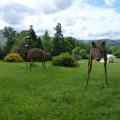
The CLIP group who came to help at the hostel were from all points of the compass across Cumbria - from Whitehaven in the West to Kirkby Stephen in the East, and from Barrow and Ulverston in the South to Carlisle in the North. They spent most of the weekend being very industrious around the hostel grounds. As well as clearing some footpaths and a stream, they crafted some brilliant wooden habitat boxes for birds, bees and lace flies. They were also taught willow-weaving, and created two fabulous willow sculptures which now grace the front of the hostel and have been much admired and commented upon.
As a well-earned reward for all their hard work, on the Sunday they had some fun by working as a team in Dragon Boating on Derwentwater. All pulling together they tried to break the course record and, although unsuccessful, managed a very respectable time of 1 minute 21 seconds.
The weekend residential went down well with the young people and here is some of the feedback they gave:
'It was fantastic - I couldn't have asked for a better day.'
'I really enjoyed the whole day and the time at the youth hostel'
'I was able to achieve certificates for volunteering and will carry on volunteering throughout Cumbria.'
As well as gaining skills in conservation and willow weaving, the young people learnt how to work as a team and became more confident. As a result, they want to take on more responsibility in their volunteering and are also increasing their employability.
Charlotte Robinson of TCV, who manages the CLIP project, said of the visit:
'It was a fantastic weekend! The weather was great, everyone took part with great enthusiasm and the young people really supported each other throughout the weekend. The willow sculptures the volunteers created look stunning in the grounds and I would encourage everyone to visit the youth hostel to have a cake and coffee and sit out on the terrace and take in the view. We are already planning our next residential to be held at the hostel in October'.
We are thrilled with the work they did for us and are particularly enamoured of the willow sculptures which will remain in the hostel grounds for many years to come and are a lovely legacy of the CLIP project.
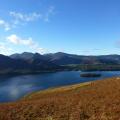
We are quite used to young people staying at the hostel whilst doing the outdoor element of their Duke of Edinburgh Award, but we are now beginning to experience some of the young people doing their residential volunteer placement within the hostel itself. One such volunteer was Flo King, who came to us in December on the five day residential placement required by the gold award. It is an opportunity for students to build on a talent, learn something new or do something to help others.
Flo worked incredibly hard over her five days, tackling mounds of dirty dishes, serving meals, interacting with the guests, making beds, cleaning toilets and helping in the grounds. She certainly got stuck in, and experienced the wide range of tasks that the hostel demands and carried them out extremely well. Flo was unfazed by the hard work and seems to have enjoyed her placement immensely: 'I worked at Derwentwater Youth Hostel for a few days over Christmas to complete my Gold Duke of Edinburgh Award. I had such a fun time and the place itself was absolutely stunning. The staff who worked there made me feel incredibly welcome and really made me feel part of the team! I would happily go back and work there any time!'
We thoroughly enjoyed having her here. It’s fantastic to see how a young volunteer develops in confidence and very soon becomes part of the staff team, and in Flo's case she was able to work independently and provide a much-needed and much-appreciated pair of capable hands. She was particularly good with our guests. We are always happy to welcome other D of E students with their placements. If you know anybody who you think might like to do their volunteer placement at the hostel, do get in touch.
March 2012.
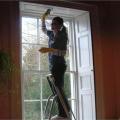
We have been extremely lucky in recent months with having people offer their services voluntarily. In addition to Flo our Duke of Edinburgh Award volunteer, stalwart seasonal staff member, Pez Bullen, has been helping put the grounds to right all over the winter whilst he waits for his seasonal job to start in the Spring.
We are also pleased to welcome Beate Fichtl from Germany. She arrived at the hostel on the 19th February and will be staying for 2 months. This is the very first time she has been to England and she has come over to polish up her English. She is studying both English and Latin at Regensburg University at home and is hoping that her experience at Derwentwater, mixing with both staff and customers, is going to help her with her English conversation. Her friend, Kathrin, volunteered at the hostel 2 years ago and recommended us to her.
Her role while she is here is to help staff with as much as of the day to day hostel work as she can. She will be helping in the kitchen and the pot wash as well as with the housekeeping. But of course, key to her English experience is her contact with customers, so visitors can expect to meet her over the morning fry-up or ladling out the soup in the evening.
Beate is looking forward to her time at the hostel: 'Derwentwater is probably one of the most inviting places I have ever been to. Not only is the area extraordinarily beautiful, but also people living in and around the hostel are very friendly, open-minded and helpful. I am sure I will benefit from my stay here, both personally and with regard to my knowledge of the English language and culture.'
We really appreciate her volunteering to help the hostel staff. Not only is it really useful to have an extra pair of hands but it’s great to be able to welcome a new person to work and live at Derwentwater - a new friend for all of us. It’s really interesting for us to find out about Germany and how their systems work - it’s educational for all the staff team as well as for the volunteer. And Beate certainly knows the way to our hearts- she came armed with a big variety of delicious Bavarian chocolates!
You don’t have to be a student to volunteer at the hostel - we welcome volunteers of all ages and experience. If you, or anybody you know, thinks they would like to offer their services - even for a few days - then we would love to hear from you.
March 2012.
We thought it was about time we had another volunteer from overseas as we hadn’t had anybody since the lovely Lise from Belgium left in May! Through the brilliant Workaway scheme we were contacted by Laura from Ludwigshafen am Rhine in South East Germany, who arrived in the first week of November to work with us for six weeks.
Like most of our European volunteers, one of Laura’s aims is to improve her English – and like most of our European volunteers we find her English is already of a very high standard. Before she came to the hostel, Laura spent several weeks in Ireland learning English at a language school in Galway. She certainly tuned in her ear, since, as well as being able to speak very fluently, she understands all our various accents and speeds of talking without having to ask us to repeat anything!
Laura says, 'I heard from friends that the Lake District should be amazing – and it is! I chose to come to Derwentwater Youth Hostel because there was a lovely picture of the building and it looked wonderful – the romantic idea of the Old English House. The first night I was here I stayed in the hostel and when I woke up and saw the view over the lake it was – wow! Everyone is very nice (She had to say that – Dave was listening! Ed) and it is a good place to work.'
Laura is pretty hardy… She now has a room in the staff house in Keswick which means that she has to cycle in to work every day. A bike was purchased from our good friend Linda Furniss at Keswick Tourist Association especially for the purpose which, with a bit of adjustment from the boys to the saddle and handlebars, suits Laura admirably! When asked what were the best and worst things about working at the hostel she said the early morning bike ride covered both – 'the good is that the cold air wakes you up and you feel healthy, but the bad is that is hard work so early in the morning!'
She wants to make the most of her time in the UK, so as well as exploring the Lake District she is trying to visit some of the cities in Northern England and Scotland. Locally, she has admired the views from Latrigg and soaked up the atmosphere at Castlerigg Stone Circle. Further afield, she has already visited Edinburgh and Glasgow with and plans to go to Liverpool or Newcastle next.
It’s lovely for the staff to have volunteers from overseas, not just for an extra pair of hands, but to learn about another country and to get a different perspective on our lifestyle and our surroundings.
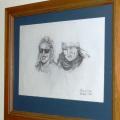
Our regular readers and guests will be aware that we have quite a few volunteers in a year. It was quite a wrench for all of us to say goodbye to our two most recent volunteers, Olivia from California and Clara from Bavaria. They’d been with us for about 7 weeks and not only were they both very good workers, but they were also great fun to be with. They tackled a wide range of jobs with their trademark enthusiasm and thoroughness - from painting the drying room floor and some of the washrooms to making cakes and serving food.
We asked them both before they left what their favourite memories would be. Some of Olivia’s best memories are of kayaking on Derwent Water on a cold day in February and encountering snow on a walk up Bleaberry Fell. A highlight for Clara was the day she walked to Watendlath with fantastic views of Borrowdale, but she said that her special memories would be of ‘every one of the super-friendly and funny staff’.
Very much in keeping with their sense of fun, they left a challenge for us after they’d left. Our only clue was 'Clara & I have left a small but significant surprise somewhere in this hostel’. It has taken some of us quite a while to find, but we all reacted the same way on spotting it – with laughter and appreciation of a great souvenir to remember our brilliant Californian and Bavarian friends. We shall leave it on display in the hostel for guests to discover too.
February 2014.
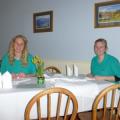
In early March, about 1115 years after Vikings started to settle in Borrowdale, two more Scandinavians arrived in the valley, introducing infectious laughter and delicious Danish liquorice to Derwentwater Independent Hostel: welcome to Mette and Anna, our two Workaway volunteers from Denmark!
Mette (23) and Anna (18) are on gap years between school and university/vocational training and they both heard about Workaway volunteering through their friends, with Mette being given the extra recommendation that the Lake District was one of the most beautiful parts of England. So far so good. Both Anna and Mette enjoyed English as their favourite subject at school and we have been very impressed by their rapid improvements in speaking and understanding, with Mette taking particular delight in learning the meaning of the word picturesque.
Mette also said that she loves the concept of having a real life in Borrowdale, allowing her to feel just like a normal resident. So what is this real life like?! Mette and Anna have been living in the staff house in Keswick, cycling to and from the hostel each day, and they have been a great help, particularly with the Expedition Medicine group, two weddings, and several pub quiz questions.
Mette and Anna have been in awe of the mountainous scenery, but they have also been inspired by the friendliness and openness of the people they have met in England. Apparently lots of Danish people are very reserved and so Mette and Anna want to be more open and talkative to friends, family, and strangers when they return home. They also love Fawlty Towers: hopefully we compare favourably to Basil Fawlty and his style of hospitality!
We have been particularly interested to hear about the Folk High Schools in Denmark. Anna attended one of these schools for 24 weeks (they are programmes for non-formal education for young people) and her programme included an international residential to Spain. Perhaps we could host a Folk School residential too? Anna is on the case!
Anna will be with us for a couple more months so we look forward to sharing more of her experiences with you. However, on 2nd April we will say goodbye (farvel) to Mette. She will be travelling to Scotland and Barcelona before returning to Denmark to pursue her ambition to be a speech therapist. Thank you and best wishes Mette!
March 2014.
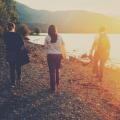
How do we cope when we say goodbye to each Workaway volunteer? We make sure another one arrives as soon as possible!
We were really sorry to say goodbye to Anna, our Danish volunteer, but we were soon welcoming Bex, our first volunteer from New Zealand. Bex was travelling outside New Zealand for the first time in her life, and she made the most of every minute, leaping up Scafell Pike within a few days of her arrival, and walking up almost every fell within sight of Barrow House.
With the last of Bex’s homemade Lolly Cake on the table, it was time to say hi to our most recent Workaway volunteer, Elisabeth Dare from the USA. We have just said goodbye to Elisabeth, but she has left us with this lovely account:
‘My name is Elisabeth Dare and in total I will have spent 3 weeks at Derwentwater. My experience here has been extremely lovely. Working in the hostel has allowed me to really get an understanding of English culture, and the staff are so kind, knowledgeable and adventurous, always travelling or making good recommendations for exploration. I've enjoyed venturing off in the afternoons to walk fells or explore footpaths through the woods. The weather has been pretty phenomenal, with hardly any rain during my stay, so I've really been able to take advantage of the outdoors.
I study both photojournalism and anthropology in the US, so my favourite thing is to photograph people and places of cultures other than my own, and I've done plenty of that in the Lake District! I absolutely love the beauty and atmosphere of the Borrowdale Valley and I have been lucky enough to photograph some breath-taking sunsets.
I will miss how readily available tea and cake are in England; they are not as popular in the US, which is a shame because I adore both! Next I'll be heading to London for a few days before I volunteer at a B&B in Brittany, France, for a few weeks. I'm so glad I chose the Lake District for my working holiday in England, as it is a bit off the beaten track for American tourists and I've gotten to see the most beautiful part of England!’
Thank you Elisabeth, and hola to Teresa, who arrives today (31st July) from Spain!
July 2014.
We were really lucky to have Teresa volunteering for us during August. Not only did she work incredibly hard in the hostel, she chatted away to our Spanish guests, making them feel very at home, and helped to make the Derwent Water Regatta a great success. Teresa took her volunteering role very seriously and we are delighted to include her thoughts and comments here:
Hi everybody! I'm Teresa and I'm from Catalonia.
Every summer I try to take advantage of my holidays (Teresa trained as a psychologist and now works as a teaching assistant in a Special Needs School), doing things which allow me to discover and explore new places, meet people, learn about their lifestyles, and experience new things...but above all I really like doing things which are useful for our society.
For me, the best way to achieve all these things is to work as a volunteer. For this reason, I've been doing volunteering holidays for the last three years, and I can say it is a great choice (Teresa has previously volunteered as a rhododendron basher in Killarney Park, Ireland, and as a general helper with Earth Connection Centre in Scotland). This year I decided to come to England, and more precisely the Lake District, because one friend told me about this stunning place. She assured me that it was worth a visit, and now I can say she was absolutely right.
Ok, so I had decided to come to the Lake District, but the key question was 'how can I volunteer and be helpful?' Surfing on the internet you can find lots of places to go and work as a volunteer, but many of them work for their own profit. I needed something more. Finally after 4 months of looking I got it. Yes! I would go to Derwentwater Hostel (found on the Workaway website) and for very good reasons. Here are people who look more thoroughly around them, and likewise try to help our society in some way or another. And in that point is where I found Derwentwater Hostel. This makes the difference. For this reason I chose to go with them.
I was at the hostel during the month of August, helping in all of the common tasks of a hostel. At first it might not sound very exciting, but now at the end of my experience I can assure you I had a really good time and it has been a worthwhile experience. Why? Well, at this point I could list all of the things that I did in my free time, but instead I would like to tell you that for me the best part of my experience has been the people from the hostel. They have been really nice and kind to me. I can say that they have tried to help me with every single thing I could need and they have been really patient with me, such as when I have not been able to find the right words in English. And beside all this, they cheered me with going to different and interesting places and doing lots of new things, like the Derwent Water Regatta and the Keswick Launch. They managed to make me feel like part of the team and I'm really appreciative of this. I'm really grateful. Thank you very much.
Thank you Teresa!
August 2014.
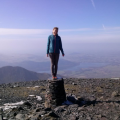
Caroline (Carrie) and Alexandra have been fantastic volunteers. Here is a little interview with Carrie:
What were you doing before coming here? I finished my Abitus (German A Levels) last summer, and I am currently spending a gap year abroad, trying to learn about other cultures, see new countries, and meet new people. Thus, I have been to Iceland for two months, where I worked on a cattle farm, and afterwards to Spain, where I helped in a rescue horse stables.
Why did you come to Derwentwater? Having always been a fan of Great Britain, I started looking for places where I could stay for a couple of months. As I had worked with animals in the other countries, I thought I would try something different, so I looked for hostels in England that took volunteers. Even though I had never heard about Keswick/Cumbria before, I immediately liked the description of Derwentwater Hostel (on the Workaway website), the work and the surroundings. All in all, I was totally happy when I received Kathy’s confirmation that allowed me to come here!
Can you share some observations from your stay here? I have to admit that I was completely surprised by the area’s beauty. As Cumbria is more or less unknown in Germany, I had never heard about the Lake District before. Once I knew that I was coming here I looked it up on the internet and thought ‘Oh it looks quite nice’ but that was not even close to the amazing reality! The landscape is simply stunning and I am lucky to be here in winter/spring when it is relatively quiet and I can observe the awakening.
Carrie is now in the process of applying to Scottish universities and so hopefully we will see her again next year, while Alexandra is due to start a Masters in Germany. It has been really fantastic to have them at the hostel: thank you both!
March 2015.
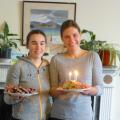
We have already had some great volunteers this year, and here we have an interview with Alexandra, from Cologne in Germany, one of our current live-in Workaway volunteers. Next month we will feature Caroline, from Dresden in Germany, who is also volunteering with us at the moment.
What were you doing before you came to Derwentwater?
I have just finished my BA in Special Education at the University of Cologne. Last month I was writing my dissertation and so I am really enjoying the physical work that I am doing here.
Why did you want to volunteer at Derwentwater?
One of my subjects is English and I want to practice it here. I think confidence in speaking English is really important for becoming an English teacher, and I am even starting to think in English at the moment! Furthermore, I decided to come here because I wanted to enjoy nature. I’ve always enjoyed walking at home, but here the walking (particularly up hills) is really, really rewarding.
Please can you share some of the observations/experiences that you have had so far?
I enjoyed really good views from Bleaberry Fell and Latrigg, but I want to do more. The landscape is so beautiful and it seems that it has a really good influence on the people who live here. They seem to be relaxed, and I have also calmed down here. I have also noticed that most of the people here are really open-minded and friendly: all of the staff have been very welcoming, and I have even had friendly greetings from ramblers and strangers in the street. I like your ‘Hey ya’: it sounds quite good. And I’m impressed with your sportiness (all of you). My plan is to become really fit in cycling and walking up hills while I’m here, and hopefully this eagerness will last in Cologne. I’ll try to take this joy of nature and calmness home.
Thank you Alexandra: we hope all this stands you in good stead for the MA you are starting when you return to Cologne.
February 2015.

What do you get if you cross CLIP conservation volunteers with coppicing and chocolate? Charcoal drawings and bonfire-baked chocolate cakes! In just two days a group of young people, who had never met each other before, became an inspirational team, using every minute of the day (and most of the night!) to improve our grounds, learn new skills, and make the most of our woodland resources.
We have been very fortunate to host several CLIP groups over the past 3 years, and each time we are amazed by the range of activities they achieve. The activities on this visit demonstrated excellent use of resources, with some delicious and highly artistic results.
On the first day Gareth Thomas of Woodmatters supervised some much-needed coppicing of the young beech trees at the top of the grounds, making an incredible difference in a short amount of time. With the left-over wood, he then showed everyone how to make charcoal, as well as techniques for whittling sticks. By the end of the day the group had also made a living willow arbour (it has developed a soft leafy canopy already!), some willow knives, a big bonfire, and some very useful barbeque sticks.
After a long day of enthusiastic hard work, the group then spent the whole of the evening outside, using their new skills and resources to fantastic effect: this was truly a zero-waste weekend! Here are two of the things they baked on the bonfire: whittled sticks wrapped in dough, flavoured with dried fruit and spices; and hollowed-out oranges filled with chocolate cake mix, wrapped in foil.
The following morning the group enjoyed a well-deserved session of dragon boating on Derwent Water: no doubt they are capable of making their own boats in the future! Then it was back to the hostel for a review of the weekend, using Saturday’s hand-made charcoal to draw pictures and diagrams.
Here are some of the comments (picture them in charcoal!) from the review:
‘I am now more confident in myself and feel that you do not need to change as people will accept you’
'I have gained key skills, such as developing group work as well as trying new things without hesitation'
Sarah Bisson, the Youth Project Officer told us: 'We have seen many young people through this project volunteer their own time to benefit others and their community - it truly is inspirational.
Thank you to everyone at CLIP for their inspirational projects. We hope you get a chance to come and lie under our willow arbour soon!
You can read more about CLIP conservation work on their blog: http://blogs.tcv.org.uk/
May 2014.
We have been very lucky to have had such great volunteers this year, and in the past month we have really enjoyed the company of Giulia Mazzoleni (Italy), Kinga Anheuer (Hungary), Felicia Buggenthin (Germany), and Ted Ferguson (UK). Here are some words from Felicia, who left us at the end of October:
'I had a great time in Cumbria! Keswick is a lovely market town with loads of nice cafes, pubs and little shops, a cosy cinema and also a very good theatre. Kinga and I usually cycled to work, but sometimes we travelled by boat: a pretty ride and a new experience for me (even though I grew up on the Baltic Sea). The boat can also take you to the bottom of Cat Bells: from the peak you have a really nice view over the lake. There are loads of paths for walking or jogging around the lake, and one Saturday Kinga and I joined in with the Keswick parkrun, along a pretty path on the old railway.
I also really enjoyed visiting neighbouring towns and places like Buttermere (a really nice walk around the lake there), Grasmere (if you like good cakes visit Baldry’s cafe) or Windermere (with the nice Wray Castle nearby) and also a day trip to Manchester, which is not too far away by train. Anyway, there is a lots to see in Cumbria so one visit can’t possibly be enough.'
Yes, we hope to see you here again Felicia!
Kinga is actually staying on with us until the end of November, and so we look forward to including a piece of her writing in the next newsletter.
October 2015.
Some of you might have met the very wet version of our Australian volunteer, Alex Scott, in our December newsletter, cycling cheerfully along the flooded Borrowdale Road. Well, we are delighted that he is still with us, working hard on all sorts of jobs, and taking part in local sports. Thank you to Alex for writing about one of his grand days out:
I shake my legs, roll my shoulders, and tie my shoes to the point where I get that tingling feeling in my ankles. I’ve been convinced to run my first fell race in the Lake District, 'Blake's Heaven': 8 gruelling kilometres of big hills. Would it be heaven or torture?
It was a beautiful day by recent Lake District standards; a whisper of light trying its very hardest to break through the low level fog as we made our way to beautiful Lamplugh, a small village from where the race would begin. As we arrived, cars lined the narrow lane; a great turn out, with runners from as far away as Yorkshire. I must say it was more of a family affair than I had anticipated, with children running about and dogs getting caught up in all the excitement. I was accompanied by my colleagues Katy and Pez - two well-versed fell runners with a number of races up their sleeves - and as we warmed up in the crisp, cool air, adrenaline was pumping. All kitted up I felt the part and I was ready to go.
From the starting line Blake’s Fell was covered in a blanket of cloud that sat upon the summit, almost balancing in the icy strong winds that battered the fells. From the get-go the running was tough: I soon found myself on all fours crawling like a newborn up a steep section of the route, but it led to a superb view back down over the lowland plains towards Whitehaven.
Through the thick bog I squelched, strangely loving every stride. I hurtled down the steep declines, taking in a view that encompassed the finish line where stalwart supporters awaited the arrival of their friends and family.
As I passed the finish line I was cheered on by a number of fellow competitors, all of whom seemed to embrace the spirit of runners as they finished. I was then greeted by a wonderful array of scrumptious cakes and hot drinks, laid on by the race organisers, Cumberland Fell Runners, and that put feeling back into my hands, and allowed us all to chat and reflect on the run.
My father always said to me 'Alexander, make everyday an adventure'. Well, my first (and certainly not last) fell race was certainly an adventure that I'll remember, and this photo shows that I really did enjoy it!
January 2016.
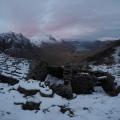
Ted Ferguson has been volunteering with us since October 2015, and he has certainly made the most of his time here so far. We will let him tell you about some of his recent highlights:
Of late, the meteorological conditions have tended to bring little more than frustration and discomfort. Over the past couple of months, it has become commonplace for me to return from a run with every stitch of clothing at saturation point, I have plucked myself out of a seemingly innocuous boggy puddle that turned out to comfortably accommodate half of an (admittedly short) person, and I have found myself running effortlessly up the final slopes of Skiddaw only to realise that I was being virtually carried on an almighty up draught. As you know, at one point the weather got so out of hand that it was not necessarily safe to shelter from it inside, the elements doing a devilishly good job of coming in uninvited in some cases.
However, if it were possible to recall every day and night of rotten weather (which it is not), one would still find some days unaccounted for. That is because every so often –just when the last remnants of faith in the joy of outdoor pursuits were about to be washed and blown untraceably away- we have been treated to some glorious days. Memories of these days have a clarity and longevity due perhaps to their contrast to the norm, and they are treasured all the more in light of their rarity (although mercifully they are making a strong comeback from the brink of extinction).
Amongst my happiest recollections of these gifts are; climbing out of a claggy Borrowdale and arriving atop a sunlit isle on High Spy, a perfect cloud inversion transforming the familiar fell tops into a gorgeous deserted archipelago; a sudden halt in work at the hostel as everyone rushed out to take in the crimson alpenglow on Skiddaw, that leant the mountain a sense of scale and splendour worthy of any Himalayan monolith (and inspired the intrepid Katy to take to the glacial lake for the finest view); a run up Grisedale Pike and beyond, that went rewarded by the longest, clearest views I have ever had, the central fells shimmering and dazzling as they paraded their finest winter coats to the full sun, and taking on a fetching pastel blue sheen in the crisp, still air; a night in a bothy under a sky so full of starlight and moonlight that the wintery fells could be made out better than if spotlighted. There are more –many more- that I will keep to myself because I have not the column inches to share them here, but one more I will attempt to put down in words.
The arrival of the snow was a sudden affair, although it had begun to cautiously colonise the fell tops, it raced down the slopes and lay about in the valley after one day and one night of concentrated effort. I awoke with a determination to put to use my new crampons that had arrived as a birthday present months ago and lain unused ever since, and arrived at the hostel to happily find Alex H in a similar state of mind. We set our sights on Blencathra, that wonderful dramatic and stately mountain for which many reserve a special place in their affections. A small epic to find a parking spot over with (some tracks were more suited to curling competitions than motor vehicles), we set off into the fresh snow. Rounding the end of the Scales Fell ridge we hit the worst of the powder, drifting to waist deep in the gullies traversed by the ‘path’. As if the continuous floundering and sliding weren’t taxing enough, we were treated to a healthy dose of spindrift administered generously to the face, it was all marvellously seasonal. However we eventually battled on to Scales Tarn and endured a desolate, wind-scoured lunch stop.
We then embarked on the mountain’s finest offering, Sharp Edge. Although Alex eventually opted to return and ascend via the less exposed but infinitely more gruelling path left of the tarn, I completed the airy expedition and we reconvened on the summit. What a treat it was up there! The famous summit edge looked more magnificent than ever before with a stream of spindrift cascading off a crest of cornices, and we were up there for an age taking in the delights of a fellscape under snow.
When the light began to ebb from the sky we grudgingly commenced the decent, and we were gifted a lovely array of crepuscular colours; violet bands of cloud over the Pennines, a streak of coral sky adorning Clough Head, and the clouds over the Derwent Fells daubed scarlet by the recently disappeared sun. The whole exquisite composition was proudly supervised by an elegant sliver of moon. We frolicked and tumbled down towards the waiting car, the effort of movement through the thick snow sapping the remnants of our strength, then glissading and rolling down the final slopes of Scales Fell, then scampering off for a well-earnt Sneck-Lifter…
January 2016.

Lucia Redecke volunteered with us throughout October, helping with a variety of tasks and guests, and making the most of the beautiful weather. Here is her account of a particularly memorable day out:
Day on Scafell Pike
Hello everyone,
My name is Lucia and I’ve been a volunteer at Derwentwater Independent Hostel during October 2016. I’m from Berlin, Germany. After having finished my law studies in summer I’ve decided to take one year off in order to make some new and different experiences. As my special field is European Law I was quite interested in spending some time in England after the Brexit vote. I chose the Lake District because a friend had told me about it with great enthusiasm and the Hostel because of the beautiful pictures and the peaceful location near the lake.
During my stay I went for several nice walks and discovered many wonderful places in the Lake District. One particular walk took me to Scafell Pike. It was a very nice sunny autumn day when we started the climb through the Corridor Route. In the beginning it was rather quiet with only a few other walkers and some sheep around us. The landscape became more and more impressive and made me sometimes doubt about still being in England. It rather felt like a film setting. Later on our path changed and we found ourselves more in some kind of rocky moon landscape. The more we approached the summit the more walkers coming from the other route joined us, some of them showing first signs of exhaustion. The last part is a little bit cruel because it always looks as if you’re nearly there before you discover another turn or climb. But finally after about three hours of walking we had reached the top and could enjoy the rewarding feeling of being at the highest point of England. The view was good so that it was even possible to see the Isle of Man. Unfortunately Scotland was a little bit hidden under some clouds. As it was getting cold after some time we decided to start the way back. Some concentration was required in the beginning not to slip on a moving stone or between two rocks. However, this was my favourite part of the walk! Afterwards the descent went quite fast, which I noticed through a funny feeling in my ears. It was a very nice and memorable day on Scafell Pike!
October 2016.
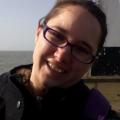
In February and March we were really fortunate to have the company of Mariana Ledi, a German student who supplements her teacher training studies with work in a hotel. One of her first shifts with us was a formal mess dinner for 60 Merchant Navy Cadets and we definitely benefited from her table-service expertise! It was very interesting to hear about her training, and the differences between our hostel and the hotel, so here is Mariana in her own words:
'In Germany I study English and Food/Nutrition Science to become a teacher at a vocational school. The course requires that we spend 90 days in an English speaking country and so I decided to spend 5 weeks at Derwentwater Independent Hostel, to have an insight into life and work at a hostel in Great Britain.
There are a few differences between the hostel and my work at a hotel in Germany. The life in the hostel is more personal, both concerning the relationship between staff and guests, and among the staff themselves, and the interesting communication at the hostel really helped to improve my English.
The colleagues in the hostel are really nice and welcoming. You can recognise them by their blue or green polo shirts, whereas in the 4.5 star hotel in Germany I have to wear a whole traditional uniform (tights, skirt, dress shirt, vest, half apron, and bow tie).
The hotel in Germany was built in the early 1930s and is very traditional, with two big halls for different occasions, for example weddings and balls for up to 300 people. I know the hotel very well, having been an apprentice there for 3 years.
So, what does my typical day in the German hotel look like? My work day starts at 5pm with a short meeting where I get the most important facts on the event. Then we check our tables and prepare other things such as food and drink for entertainers. When we have big events I have to care for usually four tables with 8 people on each table, and I will look after my guests for the evening, until they leave at about 1am.
To everyone at the hostel: thank you so much for everything I could learn and experience in the last five weeks. You made me feel very welcome, almost like a part of a big family, or, since I love food and sweets, I feel like a piece of a whole great cake. Thank you for helping me with my English, answering my questions and being patient. Yours, Mariana.’
Thank you for the chocolates, card, hard work and wonderful company Mariana! We’re sure you will be successful in your studies and become an excellent teacher: we certainly learnt a lot!
March 2017.
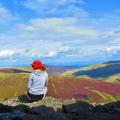
Nat, from France, volunteered with us for a month, during which time she completed the Northern section of the Wainwright fells. Here is her report:
My first visit to the Lake District, in 2007, wasn't overly planned: I only knew of the place because of it being mentioned in a Jane Austen novel and, having a few days off, I decided to give it a go. This visit was enough for me to fall in love with the area, and, unbeknownst to me, to bag my first Wainwright: the Old Man of Coniston.
The second time I went in 2015 I was more prepared: I researched interesting hikes to do, but got a little lost in the abundance of options. Once again, I bagged a few Wainwrights without knowing it: Castle Crag, Loughrigg Fell, Helvellyn, Pavey Ark, and Harrison Stickle. And it is then that I discovered, by stumbling on a poster in Ambleside Youth Hostel, a map of the Wainwright Fells, complete with the list of their names, heights and order. The thing is, I am a sucker for lists: I love their clarity, the sense of having a goal and the feeling of accomplishment that comes with ticking those boxes. The Lake District wasn't a confusing place with too many hiking choices anymore: it was a challenge to be tackled.
For my third visit, I was ready: I had a list, I had a map, I had a month, and I was on a mission. I was lucky enough to be based at Derwentwater Independent Hostel near Keswick, which gave me easy access to a lot of hiking routes reachable by public transport. My objective at the beginning of August was to find hikes that would allow me to bag as many Wainwright fells as possible in one go, and I was determined not to be deterred by bad weather. My first big hike brought me to Skiddaw via Ullock Pike, and it allowed me from the start to accept that simple fact: you cannot wait for the perfect weather if you want to hike in the Lake District. Of course, it would be irresponsible not to take the weather into consideration: if there's going to be a lot of clouds, choose a hike with lower summits; if it's going to be windy, avoid the most dangerous ridge routes. But rain shouldn't stop you, because if the Lake District is one thing, it is wet. Wear waterproof everything, and hope for the best!
My longest walk took me from Seat Sandal to the village of Threlkeld, a 25 km trek along the Helvellyn Range, with a detour to Catsycam. It is always interesting to see how popular some summits are and how the crowd fades away once you leave them behind. There is an odd feeling of kinship with the walkers you meet on the more isolated stretches that doesn't always exist on the busier sections.
One of my favourite hikes was the Robinson Horseshoe; its central position allows for the most varied landscapes: Buttermere and the highest hills beyond Honister Pass on one side, and the lovely Newlands valley on the other to begin with, and a great view over Derwent Water in its last leg.
As the days passed, my objective changed: the goal wasn't to bag as many Wainwrights as possible anymore, but to ‘finish’ some sections so as to avoid having to come back later for one or two summits only. I focused my efforts on the Northern section, and got lucky enough to go hiking with Nicola, which allowed me to bag fells that I would have had a hard time to reach by public transport. The northernmost hills have a softer edge to them that I really enjoyed. The last hike I did before leaving the Lake District was also a highlight: it wasn't an overly challenging hike as I only had two summits to reach in order to finish the Northern section (Bakestall and Great Calva), but it was a lovely stroll from Dash Falls to Keswick via the Glenderaterra Valley. Great Calva offers the most complete 360u00b0 degrees view over the whole Northern section. It was really satisfying to identify all the summits I had bagged all around me!
Of course, the downside of fulfilling a list is that you sometimes find yourself obliged to go to summits that aren't overly interesting. I wouldn't have bothered with the giant bog that is Mungrisdale Common, or with Greystones and its boring path and uninteresting view if I could have had avoided it. But then again, it is only with hindsight that I know that the view from Greystones wasn't worth the effort or that there wasn't a dry patch of ground on Mungrisdale Common. In any case, the disappointing summits were far and few between, as most of them offer gorgeous views. One of my favourite ‘surprise’ viewpoints was the summit of Raven Crag: a fairly easy walk brings you to a lovely view of Thirlmere and the Helvellyn Range.
By the end of the month, I had managed to add 74 Wainwrights to the 5 I had climbed in my two previous visits. This represents about one third of the 214 summits. The Wainwrights are an addictive challenge and, though I have barely left the Lake District, I am already looking forward to coming back for a new ‘bagging’ session.
The 74 Wainwrights tackled in the month of August:
- The 24 fells of the Northern section
- 21 fells in the North-West section (the 6 summits of the Robinson Horseshoe, the Grasmoor Six, Grisedale Pike, Rannerdale Knotts, Sale Fell, Ling Fell, Barf, Lord's Seat, Broom Fell, Greystones and Whinlatter)
- 9 fells in the Central section (High Rigg, Raven Crag, Walla Crag, Bleaberry Fell, High Seat, Steel Fell, Calf Crag, Gibson Knott, Helm Crag)
- 20 fells in the Eastern section (Stone Arthur, the 8 summits of the Fairfield Horseshoe, the 11 summits of the Helvellyn Range from Seat Sandal to Threlkeld)
September 2017.
Well, what can I say about my stay at Barrow House? – already my third stay. Again, I came with the plan that I'd spend my free time doing things for University, since my studies continue from April and there's still a lot to finish from last term. However, again it's turned out that this isn't as easy as expected.
But let’s start at the beginning: the hostel staff had already told me that heavy snow would be around the UK. And my flight from Nuremberg to Manchester was indeed awful. The airplane had already more than two hours delay and was shaking like hell because of the wind. Of course I couldn't get a train to Penrith so late, so I ended up sleeping one night in Manchester instead of arriving in the long-awaited Lake District. That was actually okay: I still enjoyed every minute and had a Cinnamon & Raisin Bagel from Sainsbury's to celebrate being back in England.
The next day was also quite difficult: all the trains to the north were cancelled because of the ‘bad weather conditions’, but until then I had still not seen any snow. But everybody talked about what had been unleashed – the beast from the east. After a while I managed to travel at least until Preston, where I caught a National Express Bus to Keswick 4 hours later. So I stuffed myself with fish, chips, sauces, chocolate and a pint of apple cider at a pub, then spent the remaining 3 hours in Waterstones which always makes me buy books: I can never resist. So I had to choose between two very different books. I left Huxley's ‘Island’ on the shelf because it probably had the worst book cover which ever existed in any Waterstones, and my choice fell on ‘Pies and Prejudices – In search of the North’ by Stuart Maconie. I thought it would be perfect to read about the North while I am in the North. I didn't like the new book soooo much in the end, but it still has some very true words in it. Already in the prologue it says that the British transport system is ‘a system so ill thought out that it takes longer to get to Norwich from Birmingham than from Birmingham to Moscow’. How right he was, and he hadn't even looked into the face of the beast. Anyway, I survived the windy journey, finally saw the snow outside of the bus, and arrived in Keswick in the evening.
For the next days I tried to catch as many hours in the snow as possible because it started to melt incredibly fast. So I went for some walks before and after my volunteer working shifts. I had walks around the Lake, up to Ashness Bridge, around Walla Crag for hanging around with some icicles (that's a word I’ve learnt during my stay: I always imagine icicles riding bicycles) and of course up Cat Bells where I've actually never walked before even though it seems to be THE attraction to do while you're in Keswick. And it really was absolutely beautiful.
A special highlight was walking up Great End after work on a really sunny, cold day. We walked through fields full of sheep (the ever-smiley ‘Herdy’ breed), and then started to climb more steeply, until eventually we reached the mountain top, which was still full of snow. We were also able to walk on Sprinkling Tarn, without breaking the ice, and above us we could see ice climbers hanging off the mountain face.
In the Lakes one great day follows another, as pronounced by National Trust leaflets. So I went up Glaramara as well. I decided I would change my name from Clara into Claramara if I enjoyed the walk. And I did love it. So from now on I call myself Claramara Tongue Head (which is another great name of a land formation in the Lakes) Fieger. For warming up after walking I can always recommend a pint of beer in front of a fire place in one of the lovely pubs between the footpaths.
Of course being in the Lakes is not only walking: being part of the life in Keswick is also very enjoyable. The Alhambra Cinema had lots of very good movies during the film festival, and its regular programme is excellent too. Having cream tea at Mrs. Fs, which is definitely my favourite coffee shop, not only because of the suiting name. And also meeting friends in the local pubs in the evening. There we talked about being out and about and how to unwind with a pint after days in the fells, laughed about some tourist's problem with the non-working wifi, and discussed the best Puddings and Pies of Barrow House (we still haven’t decided which are the very best yet). You see, there’s not much time left for doing stuff for University.
When I first came to Barrow House for volunteering in 2014, I was just about to apply to the Academy of Fine Arts in Nuremberg. So I had to draw and paint every day. And I really did and enjoyed it. I found out a lot about the Lake District’s nature with studying trees, birds, the waterfalls and the fells. But now I'm in a very different state of my life. There is nearly no drawing or painting in my artwork anymore. I work more with the ambiguity of words, creating poetic situations from everyday life. But when you’re in the Lake District you're always inspired by the landscape. So I still try to do some drawings, but it's not as easy anymore. Especially the question about what should be drawn is very difficult. All this talk at my art school about what is art and what not changes a lot of the creative flow. So what I’m actually doing in that intended ‘free time for my art’ is preparation for upcoming projects, finishing essays, and collecting impressions in all kinds of media. That includes a lot of photography; sketches; taking some voice and sound recordings with an audio recorder; and collecting words, quotes and sentences which can be useful for my word collages.
I still have some days left in the North of England and I am looking forward to exploring a lot more. But still there are many secrets, and things to save, which will bring me back again.
April 2018.
We've been very fortunate to have had Neele's help over the past month: another wonderful volunteer! Neele is from Germany, where she is doing teacher training, specialising in English and German, and she decided to spend a month with us in order to improve her English (although it seemed perfect to us!) and have a change of scene before her exams.
Neele smoothed out a lot of the mole hills on the hostel lawn, so if you're playing football in the next few months then hopefully you'll appreciate her work. She also cleaned the front porch windows beautifully, so she's really improved the 'arrival experience'.
Unfortunately we haven't left Neele with such a good legacy, for she spent her last week with a very bad cold. There are lots of good things about living in the Lake District, but unfortunately it doesn't make you immune to colds!
I'm Neele, 25, from Rostock, Germany, and I spent 4 weeks as a volunteer at Derwentwater Independent Hostel. Originally, as I'm becoming a teacher for German and English and doing my final exams this summer, I wanted to improve my English, get to know British culture, and take full advantage of active relaxation. However, it turned into so much more than I expected, for which I'm more than thankful. First of all, working at the hostel is a lot of fun, never gets boring, and brings you to work with warm-hearted, open-minded, helpful, environmentally-friendly people.
Work shifts of the staff, and with that my workmates, changed many times, and as the staff come from different areas of Britain, it gave me insights into different accents, local history and regions. There’s also a wide range of things to do as a volunteer at the Hostel, from cleaning, filling the bird feeders, and serving food to guests, to raking molehills or decorating tables with flowers.
If I was asked for the highlight of my volunteer experience, I’d say the Lake District as a whole. The region is more than stunning and gives you the feeling of relaxing vacation the minute you see all those mountains and hills meandering back to back with the lakes. As photography is my main hobby, I really enjoyed the huge amount of amazing photo motifs.
Next to all those beautiful and densely branched trees in Cumbria there are two scenes which I’ll never forget.
One was from the top of Cat Bells, which is superb already but was even more stunning on this occasion, as it started to rain the minute I got to the top, which sounds not too welcoming but as the sun stayed it caused two rainbows over Derwentwater, between which I saw the hostel. That was simply amazing!
The second was on my day trip with Nicola. On a very sunny and warm day we walked from Rosthwaite up Castle Crag to Grange and back to Rosthwaite. The path leads beside beautiful little streams, historical stone bridges and stone walls, and when you arrive on the top of Castle Crag it gives you an amazing view above Derwentwater with its mountains to the side, and as I looked down the other side, I saw all these endless interwoven mountains and the valleys along a river in between. In the valleys the sun was mixed with a bit of mist, and there it was: one of the most picturesque landscapes I’ve ever seen. As we walked, Nicola told me so many interesting facts about the region and its history (e. g. mining, Derwent pencils) but also about the English language (e. g. ‘i before e except after c’) and some British characteristics. That was my favourite day!
My time as a volunteer at Derwentwater Independent Hostel empowered me, both personally and regarding my language skills and I’ll take home with me many experiences, knowledge about the British culture and heart-warming memories. I'm already looking forward to coming back.
May 2019.
People who live in the Lakes already know that they live in one of the most beautiful areas of Great Britain. People who live in the Lakes are already used to reading about how fascinating this place is, how beautiful, how stunning. It is very difficult to find new words because there are these things you get used to after a while.
There are these things you get used to. I realised this again during my recent and fourth stay at Derwentwater Independent Hostel. Let me give you some examples:
How could it happen that I have never heard about Latrigg before? Or haven‘t even recognised it myself during my last three stays at Barrow House? It was just behind Keswick all the time. One reason could be that you can hardly see it from the hostel windows. And ‘people don‘t talk about it very much. They are used to having Latrigg always there’, she said. And it‘s also in the shadow of the majestic mountain Skiddaw.
How could it happen that I spend a whole boat ride on WhatsApp? To go to work by boat is extraordinary. ‘I will boast about it at home’, I said. So the first one or two rides are full of taking photos, staring outside, turning your head around. And then you get used to it: you are just waiting, with your phone in one hand, headphones in your ears, until you arrive at the Jetty.
How can I forgive myself for not being fired up when the new staff member saw her first red squirrel? She’d never seen one before that day. For her it was a wonderful moment and she wanted to share it with us. ‘It made my day’, she said. Of course, I am used to seeing red squirrels nearly every day, even at home. But she isn’t. For me, a new thing was seeing so many pheasants walking on the fields around Keswick.
People just get used to things. But then it is always an incredible feeling to recognise something that you can consciously enjoy, experience, share and learn!
Are there things you never get used to?
People get used to the surroundings, the culture, food, public transport, humour, weather, prices, landscapes, boat rides, squirrels, pheasants, people, the dialects...
After my stay in Keswick I went down to London. I had a conversation with a friend in the underground. We talked about this and that and that he‘s trying to learn German only by Youtube videos. So we talked about this and that in half English and half German. After a while he said, ‘we shouldn‘t speak German if people of the football team come inside. We should talk English then’.
‘But they would anyway recognize that I am from Germany.’
And then he said - and this made me very very very very proud:
‘No, they would think that you are from the North!’
May 2019.
Hey, my name is Max and I was volunteering at this lovely hostel for six weeks. I like to think of myself as a practical guy and I dislike being idle. Therefore, when packing my bag, I took care to include my work shorts.
Now these work shorts aren't just an old pair of shorts that I use whenever I don't want my nice shorts to be beaten up. No, these shorts are specifically made to help me with all kinds of tasks. The first opportunity I had to wear these shorts at the hostel was when I got to fix the hand rail, leading from the hostel terrace to the grounds below.
The shorts have many pockets: some are just like any other pockets on shorts, but some are on the side and there is also something like a sewn-in holster on the right-hand side, all of which helped me to get all the tools I needed from the basement to the stairs leading down the small hill. I stuffed a bag of screws into one side pocket, the cordless drill into the holster, clipped a tape measure to one of the pockets and finally grabbed a saw and the wood for the rails. When I started fixing the rail I planned on keeping the supporting boards. However, I soon realised it was not going to be quite that easy. I had been levering at the old rails and had removed most of the old nails, when I started having trouble with rusted off heads of the nails. They kept getting stuck and, in removing them, I had to damage the board underneath. So I ended up removing the supporting boards and replacing then as well. Once all this was done the rest of the work was easy: just measure out the boards and rails, stagger the seams and attach all of it with weather-proof screws. Cleaning up afterwards was also quick: just stuff everything back in my pockets and throw away the old boards.
The second time the shorts came in handy was for installing the new signboards at the top and bottom of the hostel grounds. The shorts are made of heavy fabric and have triple sewn seams. This allows me to just stuff a couple of hands full of screws into the outside pocket without having to worry about any tears or punctures. Like that I was able to carry all the things I needed for hanging the signs and when I started putting things together I always had a screw at hand.
The final feature on these shorts that helped me in fixing things around the property is the loop for a hammer. When I fixed fences at the very bottom of the grounds and up at the waterfall I just chucked a bunch of screws into my pockets, stuck the hammer (for removing the old nails) in the loop, and put the electric drill in my other pocket. Then I could just shoulder the boards and work all over the grounds quite easily.
Not to imply that these shorts did all the work, but whenever it came to fixing something it was nice to have something reliable to work with.
May 2019.





